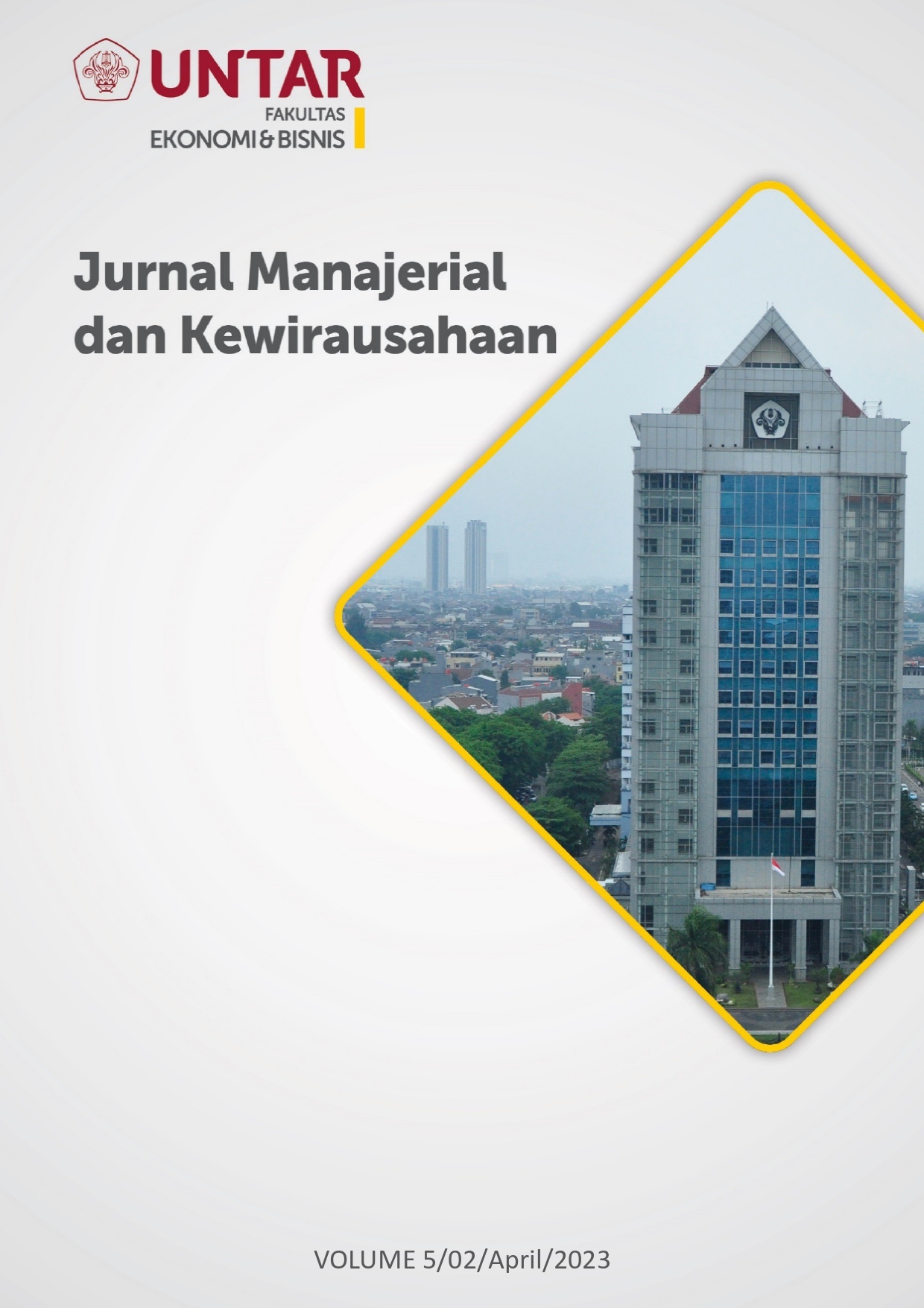Literasi Keuangan Memediasi Sikap dan Pengalaman Keuangan terhadap Minat investasi
Main Article Content
Abstract
The purpose of this research is to analyze whether 1) Financial attitude can affect investment intention; 2) Financial experience can affect investment intention; 3) Financial attitudes can affect financial literacy; 4) Financial experience can affect financial literacy; 5) Financial literacy can affect investment interest; 6) Financial attitude can affect investment intention through financial literacy; 7) Financial experience can affect interest in investing through financial literacy. Sample was collected with a non-probability sampling method of the type purposive sampling with a total of 260 respondents from Tarumanagara University students and analyzed with the help of the SmartPLS4 application. The results of this study indicate that financial attitudes and financial experience, as well as financial literacy mediating variables have a significant positive effect on investment intentions.
Article Details
Section

This work is licensed under a Creative Commons Attribution-NonCommercial-ShareAlike 4.0 International License.
This work is licensed under a Jurnal Muara Ilmu Ekonomi dan Bisnis Creative Commons Attribution-ShareAlike 4.0 International License.,/p>
References
Aisa, N. N. (2021). Do Financial Literacy and Technology Affect Intention to Invest in the Capital Market in the Early Pandemic Period? Journal of Accounting and Investment, 23(1), 49–65. https://doi.org/10.18196/jai.v23i1.12517
Ajzen Icek. (1991). The Theory of Planned Behavior. Organizational Behavior and Human Decision Processes, 50.
Akhtar, F., & Das, N. (2019). Predictors of Investment Intention In Indian Stock Markets: Extending The Theory of Planned Behaviour. International Journal of Bank Marketing, 37(1), 97–119. https://doi.org/10.1108/IJBM-08-2017-0167
Ameliawati, M., & Setiyani, R. (2018). The Influence of Financial Attitude, Financial Socialization, and Financial Experience to Financial Management Behavior with Financial Literacy as the Mediation Variable. KnE Social Sciences, 3(10), 811. https://doi.org/10.18502/kss.v3i10.3174
Bačová, V., Dudeková, K., Kostovičová, L., & Baláž, V. (2017). Financial Planning for Retirement in Young Adults: Interaction of Professional Experience, Knowledge, and Beliefs. Studia Psychologica, 59(2), 84–99. https://doi.org/10.21909/sp.2017.02.732
Dasra Viana, E., Febrianti, F., & Ratna Dewi, F. (2021). Literasi Keuangan, Inklusi Keuangan dan Minat Investasi Generasi Z di Jabodetabek Financial Literacy, Financial Inclusion, and Investment Interest Generation Z’s in Jabodetabek. Jurnal Manajemen Dan Organisasi (JMO), 12(3), 252–264.
Hastings, J., & Mitchell, O. S. (2020). How Financial Literacy and Impatience Shape Retirement Wealth and Investment Behaviors. Journal of Pension Economics and Finance, 19(1), 1–20. https://doi.org/10.1017/S1474747218000227.
Ilyas, M., Moeljadi, & Djawahir, A. H. (2022). The Effect of Financial Knowledge and Financial Well-being on Investment Intention Mediated by Financial Attitude. International Journal of Research in Business and Social Science (2147- 4478), 10(8), 175–188. https://doi.org/10.20525/ijrbs.v10i8.1530
Kanagasabai Balaji, & Aggarwal Vaneeta. (2020). The Mediating Role of Risk Tolerance in the Relationship Between Financial Literacy and Investment Performance. Colombo Business Journal, 11(1), pp.83–104. http://doi.org/10.4038/cbj.v11i1.58.
Kompas. (2020, November 5). Indonesia Resmi Resesi, Ekonomi Kuartal III-2020 Minus 3,49 Persen. Https://Money.Kompas.Com/Read/2020/11/05/111828826/Indonesia-Resmi-Resesi-Ekonomi- Kuartal-Iii-2020-Minus-349-Persen?Page=all.
Lusardi Olivia Mitchell, A. S., Bucher-Koenen, T., Currie, J., van Rooij for suggestions, M., de Bassa Scheresberg, C., Kim, H., St Louis, D., Yu, Y., Lusardi, A., & Mitchell, O. S. (2013). The Economic Importance of Financial Literacy: Theory and Evidence. http://www.nber.org/papers/w18952
Nauman Sadiq, M., & Ased Azad Khan, R. (2019). Impact of Personality Traits on Investment Intention: The Mediating Role of Risk Behaviour and the Moderating Role of Financial Literacy. Journal of Finance & Economics Research, 4(1), 1–18. https://doi.org/10.20547/jfer1904101
Onasie, V. & Widoatmodjo, S. (2020). Niat Investasi Generasi Milenial Di Pasar Modal. Jurnal Manajerial Dan Kewirausahaan, 2(2), 318-326. https://doi.org/10.24912/jmk.v2i2.7924
Reyhanloo, T., Baumgärtner, S., Haeni, M., Quatrini, S., Saner, P., & Von Lindern, E. (2018). Private- sector Investor’s Intention and Motivation To Invest in Land Degradation Neutrality. PLoS ONE,13(12). https://doi.org/10.1371/journal.pone.0208813
Thapa, B., Nepal, S., Singh Thapa, B., & Raj Nepal, S. (2021). Financial Literacy in Nepal: A Survey Analysis from College Students. https://www.researchgate.net/publication/349622597
Utkarsh, Pandey, A., Ashta, A., Spiegelman, E., & Sutan, A. (2020). Catch Them Young: Impact of Financial Socialization, Financial Literacy and Attitude Towards Money on Financial Well-being of Young Adults. International Journal of Consumer Studies, 44(6), 531–541. https://doi.org/10.1111/ijcs.12583
Yuesti Anik, Wayan Rustiarini Ni, & Nyoman Ayu Suryandari Ni. (2020). Financial Literacy in The Covid-19 Pandemic: Pressure Conditions in Indonesia. Enterpreneurship and Sustainability Issues, 8.

